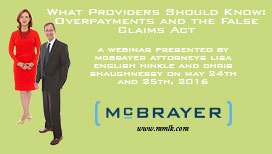Contact Us
Categories
- DEI
- Medical Cannabis
- SB 47
- Workplace Violence
- Assisted Living Facilities
- Department of Health and Human Services' Office of Civil Rights
- Medical Residents
- EMTALA
- FDA
- Reproductive Rights
- Roe v. Wade
- SCOTUS
- Medical Spas
- medical billing
- No Surprises Act
- Mandatory vaccination policies
- Workplace health
- Coronavirus Aid, Relief and Economic Security Act
- Code Enforcement
- Department of Labor ("DOL")
- Employment Law
- FFCRA
- CARES Act
- Nursing Home Reform Act
- Acute Care Beds
- Clinical Support
- Coronavirus
- COVID-19
- Emergency Medical Services
- Emergency Preparedness
- Families First Coronavirus Response Act
- Family and Medical Leave Act (“FMLA”)
- KBML
- medication assisted therapy
- SB 150
- Department of Health and Human Services
- Legislative Developments
- Corporate
- United States Department of Justice ("DOJ")
- Employee Contracts
- Non-Compete Agreement
- Opioid Epidemic
- Sexual Harassment
- Health Resource and Services Administration
- House Bill 333
- Litigation
- Medical Malpractice
- Senate Bill 79
- Locum Tenens
- Senate Bill 4
- Physician Prescribing Authority
- Chronic Pain Management
- HIPAA
- Prescription Drugs
- "Two Midnights Rule"
- 340B Program
- EHR Systems
- Hospice
- ICD-10
- Kentucky minimum wage
- Minimum wage
- Primary Care Physicians ("PCPs")
- Skilled Nursing Facilities (“SNFs”)
- Uncategorized
- Affordable Insurance Exchanges
- Compliance
- Department of Health and Human Services (HHS)
- Drug Screening
- Electronic Health Records (“EHR")
- Fraud
- Health Care Fraud
- HIPAA Risk Assessment
- KASPER
- Kentucky Board of Medical Licensure
- Kentucky’s Department for Medicaid Services
- Mental Health Care
- Office for Civil Rights ("OCR")
- Office of Inspector General of the United States Department of Health and Human Services (OIG)
- Physician Assistants
- Qui Tam
- Stark Laws
- Urinalysis
- Accountable Care Organizations (“ACO”)
- Affordable Care Act
- Alternative Payment Models
- Anti-Kickback Statute
- Centers for Medicare & Medicaid Services (“CMS”)
- Certificate of Need ("CON")
- Charitable Hospitals
- Data Breach
- Electronic Protected Health Information (ePHI)
- False Claims Act
- Federally Qualified Health Centers (“FQHCs”)
- Fee for Service
- Health Information Technology for Economic and Clinical Health Act (HITECH Act)
- Health Insurance Portability and Accountability Act of 1996 (HIPAA)
- Health Professional Shortage Area ("HPSA")
- Hospitals
- HPSA
- HRSA
- Limited Services Clinics
- Medicaid
- Medical Staff By-Laws
- Medically Underserved Area ("MUA")
- Medicare
- Mid-Level Practitioners
- Part D
- Patient Protection and Affordable Care Act (“ACA”)
- Pharmacists
- Rural Health Centers (“RHCs”)
- Rural Health Clinic
- Telehealth
- American Telemedicine Association (“ATA”)
- Criminal Division of the Department of Justice (“DOJ”)
- Health Care Fraud Prevention and Enforcement Action Team (“HEAT”)
- Hydrocodone
- Kentucky Board of Nursing
- Kentucky Pharmacists Association
- Qualified Health Care Centers (“FQHC”)
- Telemedicine
- United States ex. Rel. Kane v. Continuum Health Partners
- Webinar
- Agreed Order
- APRNs
- Chain and Organization System (“PECOS”)
- Chiropractic services
- Clinical Laboratory Improvement Amendments of 1988 (“CLIA”)
- Douglas v. Independent Living Center of Southern California
- Drug Enforcement Agency ("DEA")
- Emergency Rooms
- Enrollment
- Hinchy v. Walgreen Co.
- Jimmo v. Sebelius
- Kentucky Senate Bill 7
- Maintenance Standard
- Medicare Part D
- Minors
- Ophthalmological services
- Overpayments
- Physician Compare website
- Re-validation
- Texting
- Vitas Innovative Hospice Care
- 2014 Medicare Physician Fee Schedule (“PFS”)
- 501(c)(3)
- Affinity Health Plan
- All-Payer Claims Database ("APCD")
- Appeal
- Cadillac tax
- Centers for Disease Control and Prevention
- Chronic Care Management
- Community health needs assessment (“CHNA”)
- Compliance Officer
- Compounding
- CPR
- Denied Claims
- Dispenser
- Drug Quality and Security Act (“DQSA”)
- Essential Health Benefits
- Federation of State Medical Boards (“FSMB”)
- Food and Drug Administratio
- Form 4720
- Grace Period
- HealthCare.gov
- House Bill 3204
- ICD-9
- Individual mandate
- Kentucky Medical Practice Act
- Kindred v. Cherolis
- Kynect
- Long-term care communities
- Mobile medical applications ("apps")
- Model Policy for the Appropriate Use of Social Media and Social Networking in Medical Practice (“Model Policy”)
- National Drug Code ("NDC")
- National Institutes of Health
- New England Compounding Center ("NECC")
- Nonprofit hospitals
- Outsourcing facility
- Physician Payments
- Ping v. Beverly Enterprises
- Power of Attorney ("POA")
- Prescriber
- Qualified Health Plan ("QHP")
- Social Media
- Spousal coverage
- State Health Plan
- Sustainable Growth Rate (“SGR”)
- UPS
- "Plan of Correction"
- Advanced Practice Registered Nurses
- Arbitration
- Audit
- Business Associate Agreements
- Business Associates
- Call Coverage
- Condition of Participation ("CoP")
- Daycare centers
- Decertification
- Department of Medicaid Services’ (“DMS”)
- Division of Regulated Child Care
- Doe v. Guthrie Clinic
- EHR vendor
- Employer Group Health Plans
- Employer Mandate
- ERISA
- Fair Labor Standards Act (FLSA)
- False Billings
- Group Purchasing Organizations ("GPO")
- Health Professional Shortage Areas (“HPSA”)
- Health Reform
- Home Health Prospective Payment System
- Home Medical Equipment Providers
- Hospitalists
- House Bill 104
- Inpatient Care
- Intermediate Sanctions Agreement
- Kentucky Health Benefit Exchange
- Kentucky House Bill 217
- Licensed practical nurses (LPN)
- Licensure Requirements
- List of Excluded Individuals and Entities
- LLC v. Sutter
- Long-Term Care Providers ("LTC")
- Low-utilization payment adjustment ("LUPA")
- Meaningful use incentives
- Medicare Administrative Coordinators
- Medicare Benefit Policy Manual
- Medicare Shared Saving Program (MSSP)
- Network provider agreement
- Nonroutine medical supplies conversion factor (“NRS”)
- Nurse practitioners (NP)
- Office of the National Coordinator for Health Information Technology (“ONC”)
- Part A
- Part B
- Patient Autonomy
- Patient Privacy
- Payors
- Personal Health Information
- Personal Service Entities
- Physician Recruitment
- Physician shortages
- Provider Self Disclosure Protocol
- Quality reporting
- Registered nurses (RN)
- Residency Programs
- Self-Disclosure Protocol
- Senate Bill 39
- Senate Finance Committee Report
- State Medicaid Expansion
- Statement of Deficiency ("SOD")
- Trade Association Group Coverage
- Upcoding
- “Superuser”
- Abuse and Waste
- Autism/ASD
- Center for Disease Control
- Compliance Programs
- Consumer Operated and Oriented Plan programs (“CO-OPS”)
- Critical Access Hospitals (“CAHs”)
- Essential Health Benefits (“EHBs”)
- Genetic Information Nondiscrimination Act ("GINA")
- Healthcare Information and Management Systems Society (HIMSS)
- Kentucky Cabinet for Health and Family Services
- Kentucky Health Care Co-Op
- Kentucky Health Cooperative (“KYHC”)
- Kentucky House Bill 159
- Kentucky Primary Care Centers (“PCCs”)
- Managed Care Organizations (“MCOs”)
- Medicare Audit Improvement Act of 2012
- Occupational Safety and Health Administration (“OSHA”)
- Recovery Audit Contractors (“RAC”)
- Small Business Health Options Program (“SHOP”)
- Sunshine Act
- Employee Agreement
- Free Conference Committee Report
- Health Care Fraud and Abuse Control Program
- House Bill 1
- House Bill 4
- Kentucky “Pill Mill Bill”
- Pain Management Facilities
- Health Care Law
- Health Insurance
- Healthcare Regulation
McBrayer Blogs
Recap of the Webinar, "What Providers Should Know: Overpayments and the False Claims Act"
On May 24th and 25th, 2016, McBrayer held a webinar on what providers should know regarding overpayments and the False Claims Act. Lisa English Hinkle and Chris Shaughnessy, McBrayer healthcare law attorneys, guided participants through the interplay between overpayments from various federal healthcare programs and violations of the False Claims Act that can accrue heavy penalties. For further information on this webinar, contact McBrayer’s Marketing Director, Morgan Hall.
Some of the information shared by the presenters is also summarized below.
the scope of the problem
- Medicare pays over 4.4 million claims every single working day, paying over $430 billion per year for the benefit of more than 45 million beneficiaries.
- Medicaid pays 2.5 billion claims each year, covering more than 54 million beneficiaries in 56 state and territory-administered programs.
- In Kentucky alone, a CMS report projects that the rate of Medicare overpayments will have been 15.4% for 2015, which means that 1 out of every 7 Medicare payments to Kentucky providers is projected to have been an overpayment.
- Kentucky has the seventh highest percentage of projected overpayments for 2015.
the false claims act
- The FCA provides civil penalties for anyone who knowingly presents, or causes to be presented, a false or fraudulent claim for payment or approval, or has possession of money owed to the government and knowingly cause to be delivered less than all of that money.
- “Knowingly” for FCA purposes also includes deliberate ignorance or reckless indifference to the truth.
- The penalties for violation of the FCA are treble damages and a penalty of between $5,500 and $11,500 PER VIOLATION. These numbers add up quickly.
- In addition to government investigations, violations of the FCA can be prosecuted by whistleblowers known as “relators,” who receive a portion of the government’s recovery against violators.
overpayments
- Section 1128J(d)(1) of the Affordable Care Act requires a provider who receives an overpayment to report and return that overpayment within 60 days of the payment being identified. This is known as the “60-Day Rule.”
- If an overpayment is not returned within 60 days, it can become a violation of the False Claims Act as a “reverse false claim.”
- An overpayment has not been truly “identified” until a provider “has, or should have through the exercise of reasonable diligence, determined that the person has received an overpayment and quantified the amount of the overpayment.”
- Recipients of overpayments are obligated to report and return overpayments “within 6 years of the date the overpayment was received.”
preventing false claims
- 65.4% of the projected overpayments in the CMS report cited “insufficient documentation” as the cause of the overpayment, which means that one of the easiest ways to avoid potential FCA liability is to provide proper documentation for all claims.
- Every healthcare provider should have a compliance plan and program, and compliance training for all personnel.
- Thanks to all of our attendees and our presenter for making this a successful webinar!
If you have questions or would like to know more about how a McBrayer attorney can speak to your business or group, give the firm a call today - (859) 231-8780.

Lisa English Hinkle is a Member of McBrayer PLLC. Ms. Hinkle chairs the healthcare law practice and is located in the firm’s Lexington office. Contact Ms. Hinkle at lhinkle@mcbrayerfirm.com or (859) 231-8780, ext. 1256, or reach out to any of the attorneys at McBrayer.
 Christopher J. Shaughnessy is a member at McBrayer PLLC. Mr. Shaughnessy concentrates his practice area in health care law and is located in the firm’s Lexington office. He can be reached at cshaughnessy@mcbrayerfirm.com or at (859) 231-8780, ext. 1251.
Christopher J. Shaughnessy is a member at McBrayer PLLC. Mr. Shaughnessy concentrates his practice area in health care law and is located in the firm’s Lexington office. He can be reached at cshaughnessy@mcbrayerfirm.com or at (859) 231-8780, ext. 1251.
Services may be performed by others.
This article does not constitute legal advice.


